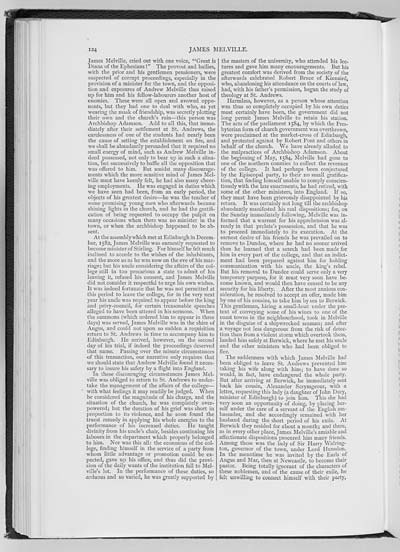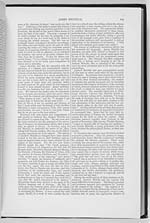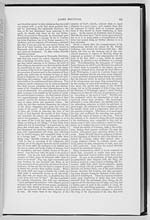124
James Melville, cried out with one voice, "Great is
Diana of the Ephesians!" The provost and bailies,
with the prior and his gentlemen pensioners, were
suspected of corrupt proceedings, especially in the
provision of a minister for the town, and the opposi-
tion and exposures of Andrew Melville thus raised
up for him and his fellow-labourers another host of
enemies. These were all open and avowed oppo-
nents, but they had one to deal with who, as yet
wearing the mask of friendship, was secretly plotting
their own and the church's ruin�this person was
Archbishop Adamson. Add to all this, that imme-
diately after their settlement at St. Andrews, the
carelessness of one of the students had nearly been
the cause of setting the establishment on fire, and
we shall be abundantly persuaded that it required no
small energy of mind, such as Andrew Melville in-
deed possessed, not only to bear up in such a situa-
tion, but successively to baffle all the opposition that
was offered to him. But amidst many discourage-
ments which the more sensitive mind of James Mel-
ville must have keenly felt, he had also many cheer-
ing employments. He was engaged in duties which
we have seen had been, from an early period, the
objects of his greatest desire�he was the teacher of
some promising young men who afterwards became
shining lights in the church, and he had the gratifi-
cation of being requested to occupy the pulpit on
many occasions when there was no minister in the
town, or when the archbishop happened to be ab-
sent.
At the assembly which met at Edinburgh in Decem-
ber, 1582, James Melville was earnestly requested to
become minister of Stirling. For himself he felt much
inclined to accede to the wishes of the inhabitants,
and the more so as he was now on the eve of his mar-
riage; but his uncle considering the affairs of the col-
lege still in too precarious a state to admit of his
leaving it, refused his consent, and James Melville
did not consider it respectful to urge his own wishes.
It was indeed fortunate that he was not permitted at
this period to leave the college, for in the very next
year his uncle was required to appear before the king
and privy-council, for certain treasonable speeches
alleged to have been uttered in his sermons. When
the summons (which ordered him to appear in three
days) was served, James Melville was in the shire of
Angus, and could not upon so sudden a requisition
return to St. Andrews in time to accompany him to
Edinburgh. He arrived, however, on the second
day of his trial, if indeed the proceedings deserved
that name. Passing over the minute circumstances
of this transaction, our narrative only requires that
we should state that Andrew Melville found it neces-
sary to insure his safety by a flight into England.
In these discouraging circumstances James Mel-
ville was obliged to return to St. Andrews to under-
take the management of the affairs of the college�
with what feelings it may readily be judged. When
he considered the magnitude of his charge, and the
situation of the church, he was completely over-
powered; but the duration of his grief was short in
proportion to its violence, and he soon found the
truest remedy in applying his whole energies to the
performance of his increased duties. He taught
divinity from his uncle's chair, besides continuing his
labours in the department which properly belonged
to him. Nor was this all: the economus of the col-
lege, finding himself in the service of a party from
whom little advantage or promotion could be ex-
pected, gave up his office, and thus did the provi-
sion of the daily wants of the institution fall to Mel-
ville's lot. In the performance of these duties, so
arduous and so varied, he was greatly supported by
the masters of the university, who attended his lec-
tures and gave him many encouragements. But his
greatest comfort was derived from the society of the
afterwards celebrated Robert Bruce of Kinnaird,
who, abandoning his attendance on the courts of law,
had, with his father's permission, begun the study of
theology at St. Andrews.
Harmless, however, as a person whose attention
was thus so completely occupied by his own duties
must certainly have been, the government did not
long permit James Melville to retain his station.
The acts of the parliament 1584, by which the Pres-
byterian form of church government was overthrown,
were proclaimed at the market-cross of Edinburgh,
and protested against by Robert Pont and others in
behalf of the church. We have already alluded to
the malpractices of Archbishop Adamson. About
the beginning of May, 1584, Melville had gone to
one of the northern counties to collect the revenues
of the college. It had perhaps been conjectured
by the Episcopal party, to their no small gratifica-
tion, that finding himself unable to comply conscien-
tiously with the late enactments, he had retired, with
some of the other ministers, into England. If so,
they must have been grievously disappointed by his
return. It was certainly not long till the archbishop
abundantly manifested his real dispositions; for, on
the Sunday immediately following, Melville was in-
formed that a warrant for his apprehension was al-
ready in that prelate's possession, and that he was
to proceed immediately to its execution. At the
earnest desire of his friends he was prevailed on to
remove to Dundee, where he had no sooner arrived
than he learned that a search had been made for
him in every part of the college, and that an indict-
ment had been prepared against him for holding
communication with his uncle, the king's rebel.
But his removal to Dundee could serve only a very
temporary purpose, for it must very soon have be-
come known, and would then have ceased to be any
security for his liberty. After the most anxious con-
sideration, he resolved to accept an offer, made him
by one of his cousins, to take him by sea to Berwick.
This gentleman, hiring a small-boat under the pre-
text of conveying some of his wines to one of the
coast towns in the neighbourhood, took in Melville
in the disguise of a shipwrecked seaman; and after
a voyage not less dangerous from the risk of detec-
tion than from a violent storm which overtook them,
landed him safely at Berwick, where he met his uncle
and the other ministers who had been obliged to
flee.
The suddenness with which James Melville had
been obliged to leave St. Andrews prevented him
taking his wife along with him; to have done so
would, in fact, have endangered the whole party.
But after arriving at Berwick, he immediately sent
back his cousin, Alexander Scrymgeour, with a
letter, requesting this lady (a daughter of John Dury,
minister of Edinburgh) to join him. This she had
very soon an opportunity of doing, by placing her-
self under the care of a servant of the English am-
bassador, and she accordingly remained with her
husband during the short period of his exile. At
Berwick they resided for about a month; and there,
as in every other place, James Melville's amiable and
affectionate dispositions procured him many friends.
Among these was the lady of Sir Harry Widring-
ton, governor of the town, under Lord Hunsdon.
In the meantime he was invited by the Earls of
Angus and Mar, then at Newcastle, to become their
pastor. Being totally ignorant of the characters of
these noblemen, and of the cause of their exile, he
felt unwilling to connect himself with their party,

![]() Universal Viewer |
Universal Viewer | ![]() Mirador |
Large image | Transcription
Mirador |
Large image | Transcription
![]()

